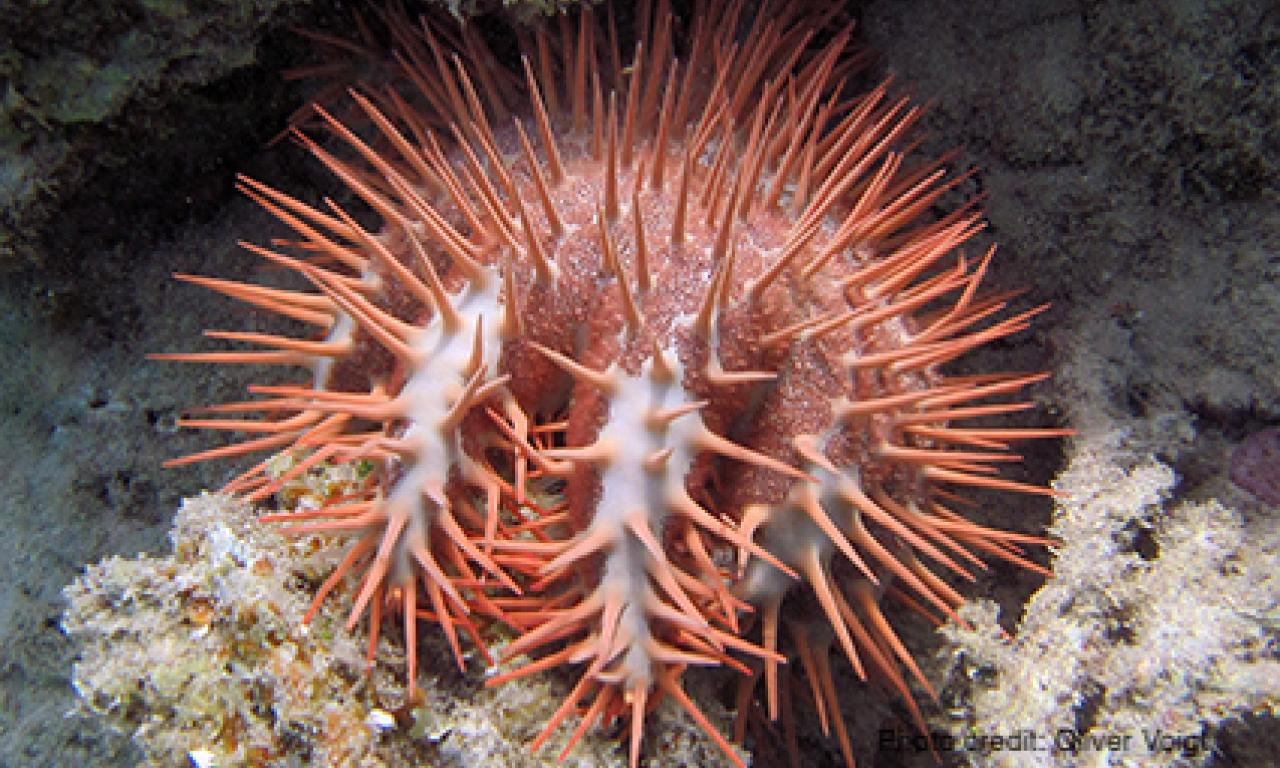
WorldFish’s Dr. John Benzie received recognition for his groundbreaking genetic studies on crown-of-thorns seastars in the 1990s and early 2000s.
PENANG, November 22, 2022 – A crown-of-thorns seastar native to the Red Sea was this week named after WorldFish’s Dr. John Benzie in recognition of his groundbreaking genetic studies on crown-of-thorns seastars in the 1990s and early 2000s.
The seastar, named Acanthaster benziei, has now been identified as a distinct species by a team led by Ludwig-Maximilians-Universität München's Dr. Gert Wörheide, Professor of Paleontology and Geobiology and Dr. Gerhard Haszprunar, Professor of Systematic Zoology, using morphological studies and genetic analyses.
On the seastar named after him, WorldFish Acting Director of Aquatic Foods Biosciences Dr. John Benzie said:
“This is really a great honor. Being recognized for the work I’ve done several years ago is truly humbling.”
Crown-of-thorns seastars (Acanthaster spp.) can be found all over the Indo-Pacific region. Their enormous, poisonous spines that stick out from their arms are how they got their moniker. In some regions of the Indo-Pacific region, the coral-eating crown-of-thorns seastars pose one of the greatest threats to tropical coral reefs as they primarily feed on the polyps of fast-growing stony corals.
On the significance of this recognition, WorldFish Interim Director General and CGIAR Acting Senior Director of Aquatic Food Systems Dr. Essam Yassin Mohammed said:
“On behalf of everyone here at WorldFish and the wider scientific community, I would like to congratulate Dr. John Benzie on this significant recognition. It is indeed an immense privilege for all of us at WorldFish to call Dr. John Benzie our colleague. This will indeed inspire us all to continue our pursuit of scientific excellence and deliver impactful work that benefits humanity.”
By clearly differentiating the various species of coral-eating crown-of-thorns seastars, researchers will now be able to do more thorough studies into the dynamics of mass breakouts, one of the several stressors that influence tropical reefs, leading to improved management of reef ecosystems in the long run.
###
NOTES TO EDITOR
Visit the WorldFish website for more information: https://www.worldfishcenter.org/
Photography:
https://www.flickr.com/photos/theworldfishcenter/
Press contact:
For more information or to request an interview:
Sean Lee Kuan Shern
WorldFish Science Communications Specialist
Email: K.Lee@cgiar.org
About WorldFish
WorldFish is an international, nonprofit research and innovation institution that creates, advances, and translates aquatic food systems science into scalable solutions. We vision an inclusive world of healthy, well-nourished people and a sustainable blue planet, now and in the future. Our mission is to end hunger and advance progress on the 2030 Sustainable Development Goals through science and innovation to transform food, land, and water systems with aquatic foods for healthier people and the planet.
For over 45 years, WorldFish's data, evidence, and insights have shaped practices, policies, and investments to end hunger and advance sustainable development in low- and middle-income countries. We have a global presence across 20 countries in Asia, Africa, and the Pacific, with 460 staff of 30 nationalities deployed where the most significant sustainable development challenges can be addressed through holistic aquatic food systems solutions. Embedded in local, national, and international partnerships, our work sets agendas, builds capacities, and supports decision-making for climate action, food and nutrition security, sustainable fisheries and aquaculture, blue economy, One Health, and AgriTech, integrating gender, youth, and social inclusion.
A core element of the 2030 WorldFish Research and Innovation Strategy: Aquatic Foods for Healthy People and Planet is focused on building the resilience of aquatic food systems to shocks, which is critical to COVID-19 response and recovery.
WorldFish is part of CGIAR, the world's largest agricultural research and innovation network.
For more information, please visit https://www.worldfishcenter.org.
About CGIAR
CGIAR is the world’s largest global agricultural innovation network. We provide evidence to policy makers, innovation to partners, and new tools to harness the economic, environmental and nutritional power of agriculture.
CGIAR has a wealth of experience and knowledge spanning 50 years that builds on a track-record of innovation and world-class research. Thanks to our funders, CGIAR research has transformed the lives of hundreds of millions of people through tangible research outcomes.
The 15 CGIAR Research Centers are independent, non-profit research organizations, conducting innovative research. Home to more than 8,000 scientists, researchers, technicians, and staff, CGIAR research works to create a better future for the world’s poor. Each Center has its own charter, board of trustees, director general, and staff. CGIAR Research Centers are responsible for hands-on research programs and operations guided by policies and research directions set by the System Management Board.
For more information, please visit https://www.cgiar.org.